
Happy Sunday, and to those who are celebrating Mother’s Day, a lovely afternoon.
On Thursday morning, when I arrived at my regular yoga class, a good friend commented on the slouchy pants I was wearing. “Love them!” he said. “Not your usual look.” (The usual look is leggings.) Without skipping a beat, I replied, “yeah, I’m feeling lousy about my body today, so not in the mood for spandex.”
The thing is, I offered this reply lightly, with a smile. I wasn’t registering distress or confiding in him sadly (though it would have been fine if I had been). What made the moment special was the fact that I was in the midst of what I used to call a “bad body day” and feeling pretty OK about it.
Just over a decade ago, I wouldn’t even have been able to speak so freely about a moment of low self-image. Back then, I didn’t only want to manipulate my body into being precisely what I wanted it to be: I also wanted to pretend that the results were effortless. I wanted the world to believe that I maintained my underweight frame without any effort at all, that I was simply immune to the ebbs and flows in self-esteem that affect so many of us. I was ashamed of my body—desperate for it to be something it wasn’t—and I was ashamed of my shame, too.
Making peace with food came long before making peace with my shape in recovery. Whether or not one has struggled with an eating disorder, body acceptance is no easy process. The approach that works best for me is to adopt a position of body neutrality and body respect; a lot of messages about self-love, at least as it extends to body image, simply don’t feel authentic to me. But I made a vow to myself many years ago that I would respect my body and treat it well even if I couldn’t love its appearance, and I’ve kept the promise ever since.
Even this position hasn’t always been easy, but with each year it gets easier and more automatic. I realized on Thursday that the embarrassment I used to feel about my body and my relationship with it is receding, too. That I could shamelessly (and even humorously) admit to someone who doesn’t know my story with food that I was having a moment of low body image marked a new kind of openness and ease about something that I’ve guarded secretively for a long time.
In the past, I greeted bad body days with a playbook of coping mechanisms. They were valuable, but I need them less these days. I can feel uncomfortable in my skin without feeling as though I have to do something about it: I know that it’s just a passing feeling. I can recognize it without identifying with it.
During last Friday’s panel, there was a long discussion of the word “recovered.” What does it mean? What constitutes recovery? When does one know that it’s time to identify that way? Many of the ED recovered dietitians present felt very strongly about using the world firmly; they noted that they think it’s important to model full recovery and hold space for it for their patients.
I understand this completely, but the older I get, the more comfortable I am with the idea of being recovered in some ways, “in recovery” in others. I don’t engage in ED behaviors with food or exercise, and my body is at a biologically appropriate weight for me, which means that I’m “recovered” by many standards. I still feel old impulses or compulsions sometimes, but I don’t act on them, which I think is also an expression of recovery.
But compulsion and a desperate yearning for control still pop up in other areas of my life, and without my ED to serve as an outlet they’re often fierce and persistent. My anxiety is worse now than it was when I could hide within the rhythms and routines of anorexia. Things come up that evoke my ED, even if they aren’t the ED itself. In this sense, I’m a person who’s “in recovery” and may always be—a process that doesn’t preclude my having a beautiful relationship with food and feeding myself.
Yesterday I took a terrifying tumble down a long flight of wet subway steps in the rain. According to this morning’s urgent care visit and X-ray, I have a sprained wrist. Ten years ago, I think my immediate response would have been intense dissatisfaction with having a bodily impediment—possibly coupled with panic about whether or not I’d be able to exercise.
These thoughts didn’t even occur to me. In the moments after the fall, I could only think one thing, which is how grateful I was that it hadn’t been worse: a head injury, a broken limb, taking another person down the stairs with me. And when I saw the X-ray this morning I could only give thanks that my bones, which I haven’t always been good to, were safe.
This is my recovery: messy mornings of feeling at odds with my body, followed by moments of intense and poignant gratitude to it and for it. Being triggered now and then, but feeling secure in the transience of it all. Being able to joke about a bad day—not to hide my suffering, but because I’m treading lightly through the mud. Having a scare, and greeting it with more perspective than I ever have before.
I’m entering this new week with deep appreciation of this body of mine and everything it gives me. Happy Sunday, and here are the recipes and links that caught my eye this week.
Recipes
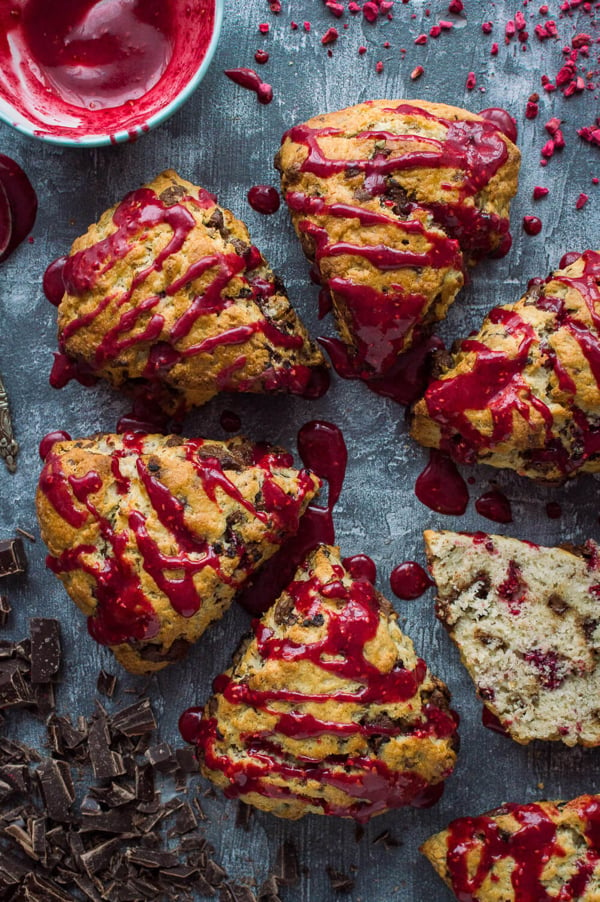
If I’d only had the energy for one-armed baking this morning, I’d have made my mother these delightful vegan chocolate raspberry scones for Mother’s Day.
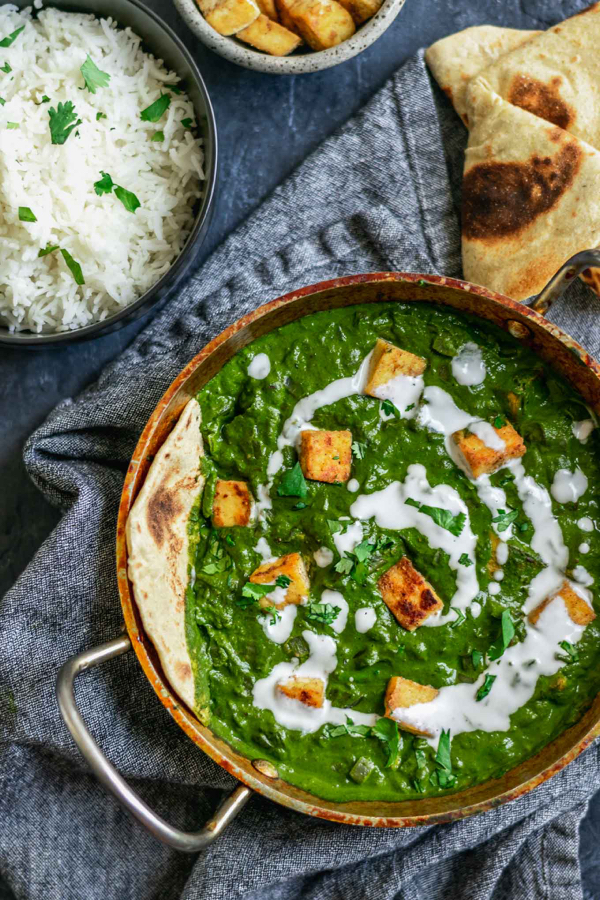
I’m blown away by the vibrant color of Eva’s vegan palak paneer.
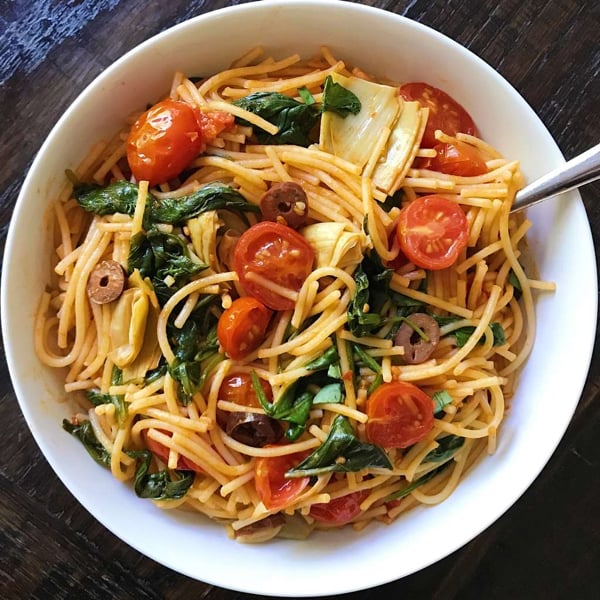
I have a feeling I’ll be making Karen’s simple Mediterranean veggie pasta all summer long.
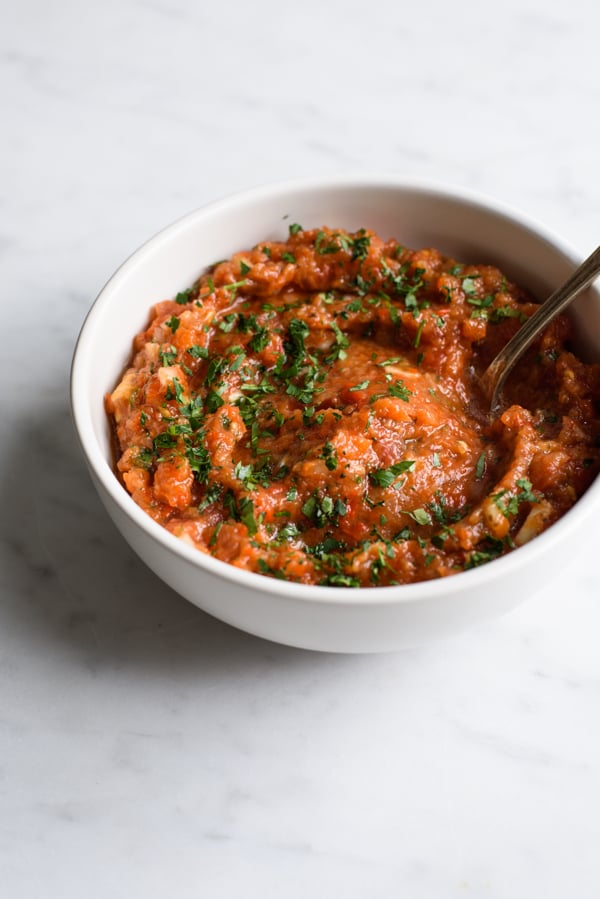
Another summery treat: Russian roasted eggplant spread, or ikra.
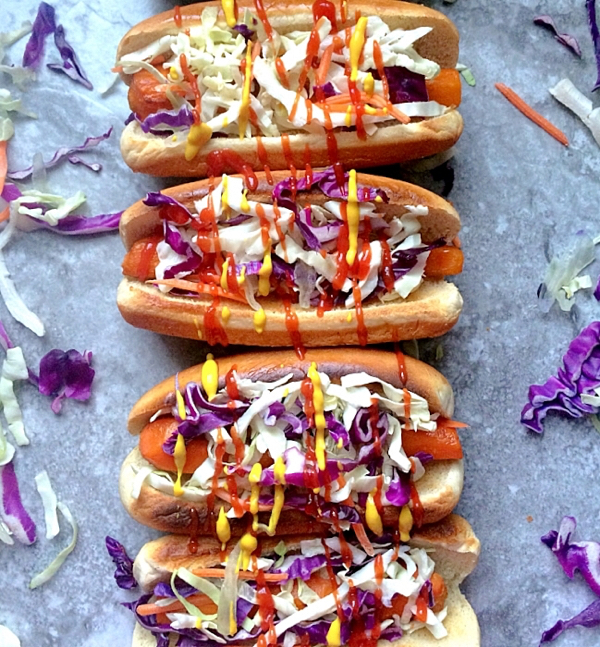
A totally genius vegan comfort food idea: carrot dogs!
Reads
1. In my work with clients, I’m always amazed to hear how deep and lasting the wounds of body shaming early in life are. According to a new study, being called “fat” in the early teens puts girls at higher risk for developing EDs, and the association is greater if the word is uttered by a family member.
2. I loved this: seven women reflect on their unconventional mother figures.
3. Vegan dietitian Matt Ruscigno addresses new disagreement about soy in an article for Today’s Dietitian. The controversy in question is whether or not soy still deserves the qualified health claim as being a cholesterol-lowering food. Whether the FDA revokes the claim or not, the evidence for soy as a nutrient-dense and beneficial protein source is still strong.
4. Smart ideas about how physician and nurses’ time can be better managed, freeing them up to deliver higher-quality patient care.
5. On a similar topic, thoughtful reflections from a third-year resident on whether or not it’s ever acceptable for doctors to give their patients gifts.
I’ll be back tomorrow with a quick, easy, and delicious new breakfast recipe. Till then, be well!
xo
The post Weekend Reading, 5.13.18 appeared first on The Full Helping.